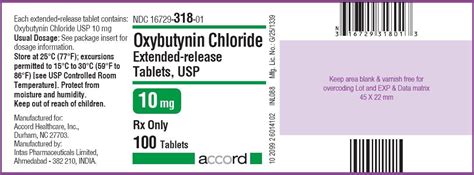Oxybutynin Used For

Oxybutynin is a medication primarily used to treat overactive bladder (OAB) and its associated symptoms. The drug belongs to the class of anticholinergics or antimuscarinics, which work by relaxing the muscles in the bladder. This action helps to increase the storage capacity of the bladder, reducing the urge to urinate and the frequency of urination, as well as decreasing the likelihood of involuntary loss of urine (incontinence).
Mechanism of Action
Oxybutynin acts by competitively inhibiting the muscarinic acetylcholine receptors, specifically M1 and M3 subtypes. These receptors are found in the smooth muscle of the bladder. By blocking these receptors, oxybutynin decreases the contractility of the bladder muscle, which in turn reduces the urgency and frequency of urination. It also has a direct relaxant effect on the smooth muscle, further contributing to its therapeutic effects.
Indications
- Overactive Bladder (OAB): The primary use of oxybutynin is to manage the symptoms of OAB, which include urinary frequency, urgency, and incontinence.
- Neurogenic Bladder: It can be used for the treatment of neurogenic bladder caused by spinal cord injury, spina bifida, or other conditions affecting bladder control.
- Detrusor Instability: Oxybutynin is effective in managing detrusor instability (now more commonly referred to as overactive bladder syndrome), which is characterized by an urgent need to urinate, frequent urination, and nocturia (waking up at night to urinate).
Administration and Dosage
Oxybutynin is available in various formulations, including tablets, syrup, and transdermal patches. The choice of formulation may depend on patient preference, side effects, and specific needs. The typical oral dosage for adults is 5 mg two to three times a day, with the possibility of increasing the dose after a period of adjustment, usually up to a maximum of 5 mg four times a day. However, dosages should be adjusted according to the patient’s response and tolerance.
Side Effects
While oxybutynin is effective in managing symptoms of overactive bladder, it is not without side effects. Common side effects include: - Dry mouth - Constipation - Blurred vision - Headache - Dizziness - Nausea - Somnolence (drowsiness)
The side effect profile is largely due to its anticholinergic properties, affecting not just the bladder but other parts of the body with muscarinic receptors.
Precautions and Contraindications
Oxybutynin should be used with caution in certain populations and conditions, such as: - Elderly patients: Due to a higher risk of cognitive and anticholinergic side effects. - Pediatrics: Should be used with caution in children, especially those under 5 years, due to potential side effects. - Gastrointestinal conditions: Patients with gastrointestinal obstructive disorders, such as pyloric stenosis, should avoid oxybutynin. - Myasthenia gravis: Oxybutynin may worsen the condition. - Narrow-angle glaucoma: Patients with this condition should use oxybutynin with caution, as it may worsen glaucoma symptoms.
Conclusion
Oxybutynin is a valuable medication for managing overactive bladder and associated symptoms, offering relief to many individuals affected by these conditions. However, its use should be carefully considered in light of potential side effects and contraindications, and under the guidance of a healthcare provider to ensure safe and effective treatment.
What is oxybutynin primarily used for?
+Oxybutynin is primarily used to treat overactive bladder (OAB) and its associated symptoms such as urinary frequency, urgency, and incontinence.
How does oxybutynin work?
+Oxybutynin works by blocking the muscarinic acetylcholine receptors in the bladder, which helps to decrease bladder muscle contractions and increase bladder capacity, thus reducing the urgency and frequency of urination.
What are common side effects of oxybutynin?
+Common side effects of oxybutynin include dry mouth, constipation, blurred vision, headache, dizziness, nausea, and somnolence (drowsiness), largely due to its anticholinergic properties.
Who should use oxybutynin with caution?
+Elderly patients, children, individuals with certain gastrointestinal conditions, those with myasthenia gravis, and patients with narrow-angle glaucoma should use oxybutynin with caution due to potential side effects or worsening of their condition.



